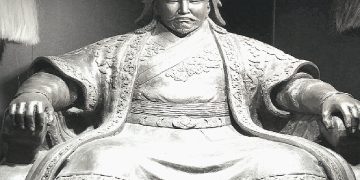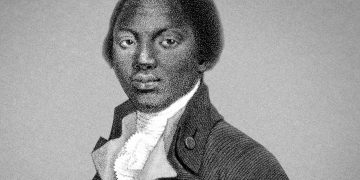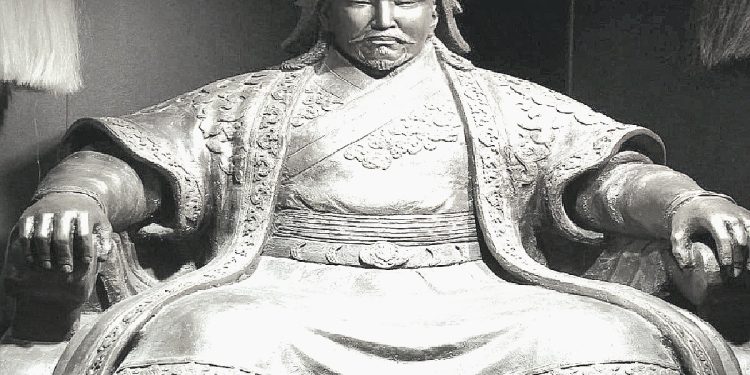Genghis Khan: The Legacy of a Mongolian Legend
Genghis Khan, born as Temüjin around 1162, is one of history’s most renowned and controversial figures. He is celebrated as the founder of the Mongol Empire, which became the largest contiguous empire in history after his death. His life and legacy are marked by incredible military conquests, innovative governance, and a complex cultural impact that still resonates today.
Early Life and Rise to Power
Temüjin’s early life was fraught with adversity. Born into the Borjigin clan in the harsh steppes of Mongolia, he faced numerous challenges, including the kidnapping of his wife, Börte, and the assassination of his father. These events fueled his desire for power and unity among the fragmented Mongolian tribes. By the late 12th century, he began to forge alliances and build a loyal following, gradually consolidating power through both diplomacy and warfare.
In 1206, after years of conflict and unification of the Mongol tribes, Temüjin was proclaimed Genghis Khan, meaning “Universal Ruler.” This marked the beginning of his remarkable campaigns of conquest.
Military Strategies and Conquests
Genghis Khan was not just a fierce warrior; he was also an astute strategist. He revolutionized military tactics with innovations such as the use of highly mobile cavalry units, psychological warfare, and a meritocratic approach to leadership, where loyalty and skill were rewarded over noble birth.
His conquests began in Central Asia, where he defeated the Khwarezmian Empire, employing brutal tactics that instilled fear and respect. His army’s rapid expansion continued into China, Persia, and beyond, leading to the capture of vast territories. At its height, the Mongol Empire stretched from Eastern Europe to the Sea of Japan, encompassing diverse cultures and peoples.
Governance and Cultural Exchange
Despite his reputation for brutality, Genghis Khan’s governance was marked by a degree of tolerance and pragmatism. He established a legal code known as the Yassa, which emphasized order and discipline. Under his rule, trade flourished along the Silk Road, facilitating cultural exchanges between East and West. The Mongols promoted religious tolerance, allowing various faiths to coexist within their empire.
Genghis Khan also recognized the value of knowledge and communication. He encouraged the use of a written script and initiated the creation of a postal system that connected the vast empire, enhancing administration and trade.
Legacy
Genghis Khan’s legacy is multifaceted. He is often viewed through a lens of brutality due to the sheer scale of his conquests and the destruction that accompanied them. However, he also laid the foundations for a vast empire that fostered trade, cultural exchange, and communication across continents.
His descendants continued to expand the empire and established influential dynasties, including the Yuan Dynasty in China. Today, Genghis Khan is seen as a symbol of national pride in Mongolia, where he is revered as a unifier and a national hero.
Wealth
Estimating the wealth of Genghis Khan is complex due to the historical context and the lack of precise records from the 13th century. Unlike modern concepts of wealth measured in currency, Genghis Khan’s wealth can be understood in terms of resources, land, and power.
Wealth in Terms of Land and Empire
At the height of his power, Genghis Khan controlled vast territories across Asia and parts of Europe, making him one of the most powerful leaders of his time. The Mongol Empire encompassed diverse regions with abundant resources, including agricultural land, trade routes, and cities rich in culture and commerce. This vast empire provided Genghis Khan with tremendous wealth in terms of land and influence. You May Also Like This
Wealth from Conquest
Genghis Khan’s military campaigns often resulted in the acquisition of wealth through plunder and tribute. His conquests brought immense riches from defeated enemies, including gold, silver, precious stones, and other valuables. Cities that resisted him faced destruction, while those that surrendered often became tributary states, contributing resources to the Mongol treasury.
Trade and Economic Influence
Under Genghis Khan’s rule, trade along the Silk Road flourished. The Mongol Empire facilitated commerce between East and West, leading to increased wealth through trade tariffs and control over key trading routes. This economic influence further enhanced the resources available to Genghis Khan and his successors.
While it’s impossible to provide a specific figure for Genghis Khan’s wealth, his power, control over extensive territories, and the resources acquired through conquest and trade indicate that he was extraordinarily wealthy in the context of his time. His legacy as a powerful ruler continues to be felt in modern discussions of wealth and influence. join our tech community and be part of the digital revolution!
Genghis Khan’s life story is a testament to the complexities of leadership and legacy. His impact on world history is undeniable, as he reshaped the geopolitical landscape of the medieval world and set the stage for global interactions that continue to influence us today. Whether viewed as a ruthless conqueror or a visionary leader, Genghis Khan remains a captivating figure whose influence transcends time and borders.












